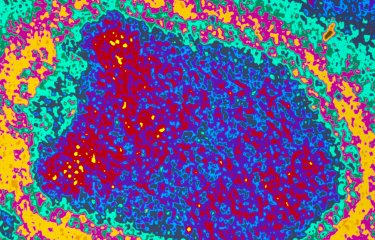-
News | 2017.10.19
Explanation and advice following the case of rabies in France
The unfortunate and exceptional case of rabies in France (in October, 2017) highlights the need to inquire about the potential risks when traveling abroad beforehand. The disease is always fatal once the first clinical signs have appeared and is responsible for 59,000 deaths worldwide annually. There is currently no effective treatment after the onset of clinical signs.When traveling abroad...
-
News | 2016.12.15
Two major types of rabies that evolved in different ways
Scientists studying hundreds of genome sequences of the rabies virus at the Institut Pasteur have shown that two major viral types – bat rabies and dog rabies – evolved in different ways. These genetic data provide evolutionary models that may explain transmission between one species and another.Diseases transferred from vertebrate animals to humans represent a very real threat to human health....
-
News | 2017.11.27
International workshop in Iran to strengthen surveillance and control of rabies
Although there is an effective vaccine, rabies is still present in over 150 countries worldwide. The countries of the Middle East and Central Asia are particularly affected by this viral disease, including Iran where rabies is endemic.In order to strengthen the surveillance and control of rabies in these regions, the Institut Pasteur in Iran organized an international workshop, from October 8 to...
-
News | 2023.07.24
Rabies: elucidating the disease to limit spread and prepare for future outbreaks
Although rabies control has progressed considerably since Louis Pasteur first trialed his vaccine, the disease continues to kill thousands of people who do not have access to treatment. Scientists have traced the evolution of the disease worldwide over different eras in a bid to improve our understanding of and preparedness for emerging infectious diseases.
-
News | 2018.01.19
Proof-of-concept study reveals feasibility of eliminating rabies in Africa
The Swiss Tropical and Public Health Institute, together with European and African collaborators (including the Institut Pasteur in Paris), carried out a mass dog vaccination in Chad and determined its effect on human rabies exposure. The study employed a bio-mathematical method for estimating the transmission dynamics of rabies. The researchers conclude that with political will and the necessary...
-
News | 2019.09.27
Rabies: a shorter, cheaper vaccination schedule following a suspected rabid dog bite
A study by teams from the Institut Pasteur du Cambodge and the Institut Pasteur in Paris confirms the efficacy of the new post-exposure rabies vaccination schedule developed in the Institut Pasteur International Network and adopted by the World Health Organization (WHO). Since 2018, WHO has recommended post-exposure vaccination for rabies, immediately after a bite by a suspected rabid...
-
News | 2021.05.20
Rare case of death following infection by a bat-borne virus related to rabies
Rabies is still responsible for approximately 60,000 deaths in humans each year. The bat-borne virus EBL1a, related to rabies, rarely affects humans, but a case was recently reported in mainland France. The virus was identified thanks to a collaborative effort between the Institut Pasteur and the Limoges, Pitié-Salpêtrière and Necker-Enfants Malades (Paris Public Hospital Network – AP-HP)...
-
Article | 2016.11.10
The final years 1877-1887
Between the age of 55 and 65 Louis Pasteur developed microbiology, applying it to medicine and surgery. Having established that diseases were caused by microorganisms, he then sought to identify and find a means of fighting them. His finest accomplishment was rabies.
-
Article | 2017.03.21
At international the level
From its very early days, the Institut Pasteur has enjoyed support from across the world. The original international appeal, launched to provide Louis Pasteur with the resources he needed to improve vaccination against rabies, work with other scientists on a number of infectious diseases and train up new generations of scientists, met with huge success.
-
Article | 2016.12.02
Health
The Institut Pasteur is putting its scientific expertise to work for the health of populations and individuals. The Institut Pasteur in Paris is home to several national and international centers of expertise that monitor infectious diseases. And the Institut Pasteur Medical Center — which vaccinates thousands of people every year — specializes in infectious and tropical diseases, travel medicine...

